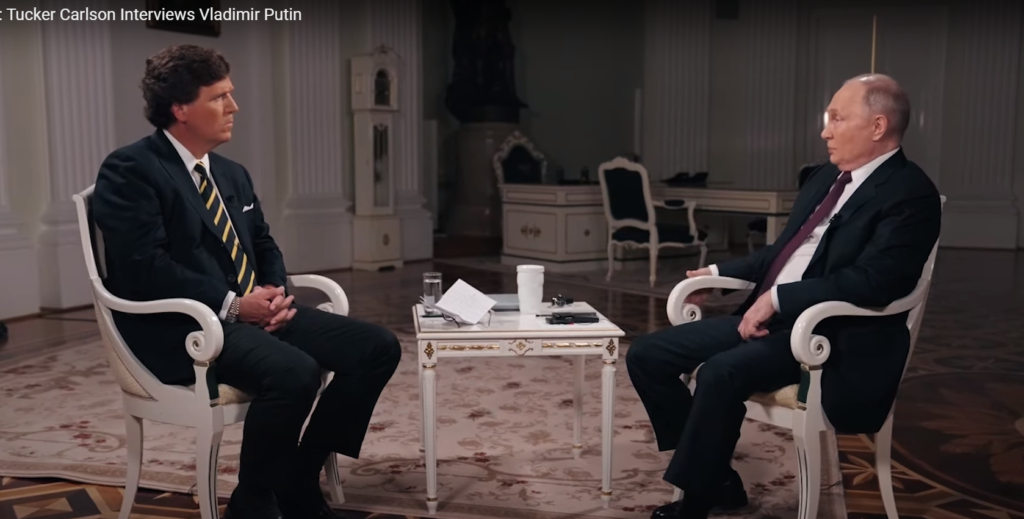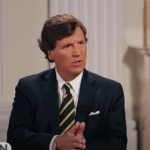On February 6, 2024, Tucker Carlson, a popular television star, conducted a two-hour interview with Russia’s President Vladimir Putin. Here are the main take-aways:
[1] The Russian president firmly believes that Russians and Ukrainians are one and the same nation divided by history. He proved this point by giving Tucker Carlson a brief overlook of the past, commencing with medieval Rus’ and ending at the present day. Russia’s president was well conversant with the history not only of his own country, but also with the history of this region in Europe. This lengthy narration was to set the basis for the explanation of anything that followed during the interview.
In this historical narrative President Putin appears to have tried to drive a wedge between several European countries in that he kept saying that before the Second World War Poland collaborated with Hitler (which is why it took part in dismembering Czechoslovakia), and after World War Two was given formerly German territories as compensation for the territories that it lost to the USSR in the east. It could be read by Germans as an invitation to lay a claim to Polish Western territories (formerly German eastern territories). Four times Germany (Prussia) and Russia (USSR) divided between themselves the territory of the Polish state, annihilating it from political maps. Putin’s verbal assault on Poland will most probably have been triggered by the bellicose attitude of Warsaw against Russia and the fact that – as he said – Poles make up the largest contingent of mercenaries in Ukraine, followed by Americans and Georgians.
Similar gestures were made towards Hungary and Romania: these countries, too, lost small chunks of their territories to the then USSR, to be precise to the Ukrainian Socialist Soviet Republic, and as a result they are still held by Kiev.
[2] Then the Russian president retold the events running up to the current hostilities. These included:
[a] the five waves of NATO expansion;
[b] the support given by the United States to separatist forces in Russia;
[c] the deployment of missiles in eastern Europe allegedly to defend it against Iranian missiles;
[d] the invitation of Ukraine and Georgia to join NATO (Bucharest NATO conference);
[e] the support of the Nazi elements in Ukraine by the Western powers; and
[f] the coup d’état carried out in Kiev in 2014 against President Yanukovych.
[3] Being asked by Carlson whether the conflict could be resolved by way of negotiations, President Putin said that:
[a] Russia has been ready to negotiate since day one; as proof he mentioned the Istanbul talks of March 2022, which were prevented from finalization by Boris Johnson;
[b] President Zelensky issued a ban on negotiations;
[c] it was now the West’s turn to come to resume talks as it was the West thwarted the negotiations.
[4] To the question whether Russia was not about to attack Lithuania or especially Poland, the president answered that such an attack was only possible if Poland launched an attack against Russia.
[5] Being asked whether Russia did not fear China more than the United States, Vladimir Putin said that China and Russia had always known how to cooperate and that China had always been presented by the West as a boogeyman, which, however, did not correspond to reality.
Generally, Russia’s president believes that the West overplayed its hand out of conceit and at present does not really know how to solve the problem. The many sanctions did not have the expected effect: worse, Russia is developing while the dollar’s role as a means of international business is diminishing because of the same sanctions. Vladimir Putin quoted from memory that if a few years earlier 50% of Russia’s transactions were conducted in dollars, it is down to 13% nowadays.
The whole talk ended on a somewhat optimistic note: Russia is ready to talk over Ukraine, but the initiative rests with the West. The West has committed the mistake of drawing Ukraine into the war, the West ought to rectify it. There should be found ways, said the Russian president, how to do it with dignity, meaning: how to save the West’s face.





